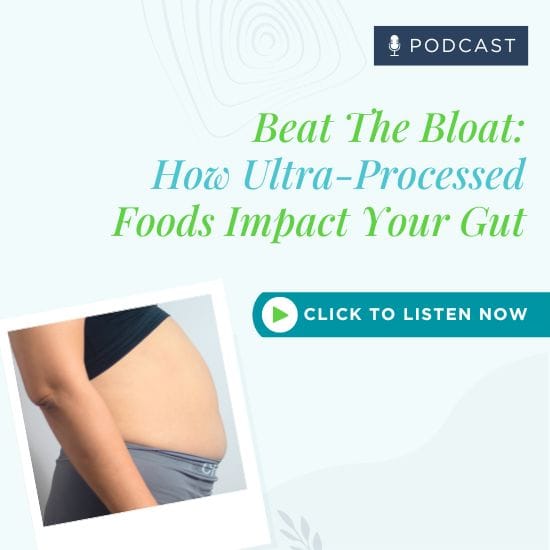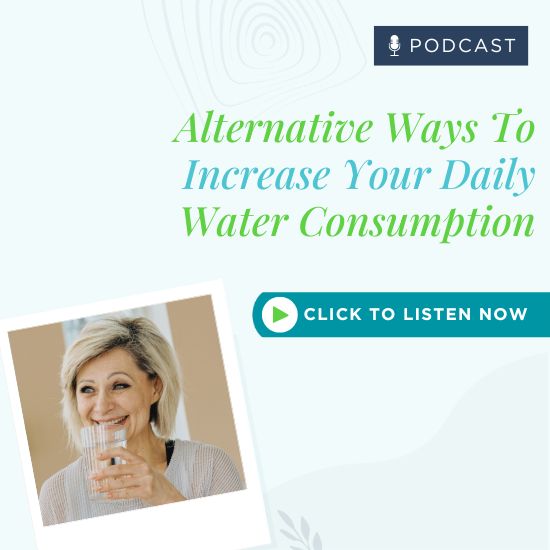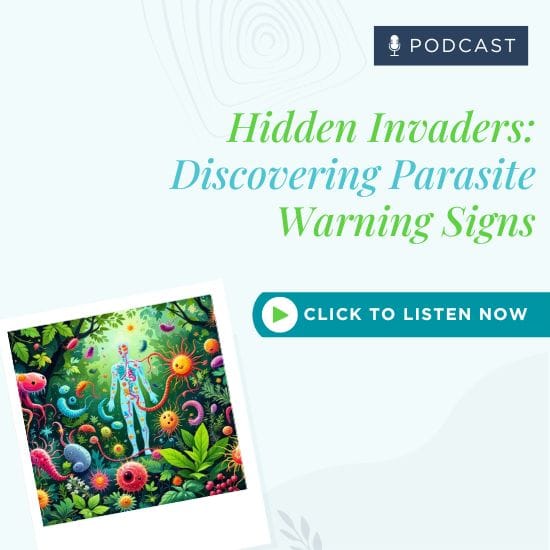Episode Transcript
[00:00:00] Speaker A: You know that feeling when your energy just completely tanks or you get these like really odd cravings out of the blue?
[00:00:06] Speaker B: Yeah, that feeling.
[00:00:06] Speaker A: It might not just be stress or lack of sleep, it could actually be uninvited guests. Parasites.
[00:00:13] Speaker B: It sounds intense, but it's surprisingly common and often overlooked.
[00:00:17] Speaker A: Totally. And that's what we're diving into today on natural remedy secrets brought to you by Authoritative Wellness.
[00:00:22] Speaker B: Exactly. Our whole goal here is really to empower you with knowledge about these less talked about health challenges. Understanding your body, what might be throwing it off balance, that's step one to feeling better.
[00:00:35] Speaker A: Absolutely. So in this deep dive, we're going to explore some natural ways to help your body. You know, encourage these critters to leave and get your energy back, feel like yourself again.
[00:00:45] Speaker B: We'll cover understanding them, spotting the signs, and then get into practical natural methods.
[00:00:51] Speaker A: Things like diet changes, herbal remedies, and.
[00:00:55] Speaker B: Just so everyone knows, we'll have links in the show, notes with more details, resources on recognizing signs, steps for gentle cleansing, even options for a more aggressive but still safe approach if needed.
[00:01:08] Speaker A: Perfect. Okay, let's start at the beginning. Parasites. What, what exactly are we dealing with? It still sounds a bit sci fi, huh?
[00:01:16] Speaker B: Yeah, it can sound that way, but really parasite is a broad term. It covers everything from microscopic protozoa, single celled organisms, tiny things, really tiny, all the way up to larger worms that you definitely wouldn't want inside. And the thing is, they're pretty good at getting into our systems.
[00:01:34] Speaker A: Easier than you'd think, I guess.
[00:01:35] Speaker B: Much easier sometimes. Think about international travel, different food sources, even just tap water in some places. Contaminated food water, those are really common entry points.
[00:01:45] Speaker A: And skin contact too, you mentioned.
[00:01:47] Speaker B: Yep. Some can enter right through the skin. They have these complex life cycles and often they just find a way.
[00:01:51] Speaker A: Okay, that makes you think. So if they're so sneaky, how would someone even suspect they have them?
[00:01:56] Speaker B: That's the tricky part. A lot of infections are actually what we call subclinical or silent, at least initially. They could be living in there, using up nutrients, causing low grade inflammation, and.
[00:02:08] Speaker A: You might just feel a bit off. But not connect the dots.
[00:02:10] Speaker B: Exactly. You might blame it on stress or diet or just being busy. The symptoms can be subtle or seem unrelated at first.
[00:02:18] Speaker A: Which is why knowing the potential signs is so important.
[00:02:21] Speaker B: Precisely. Knowledge is power here. It helps you listen to your body and consider, you know, maybe I need some natural support.
[00:02:28] Speaker A: Okay, let's get into those signs then. What are the common red flags people should be aware of?
[00:02:33] Speaker B: Well, one of the Biggest ones, honestly, is unexplained fatigue. Just feeling wiped out day after day, even when you think you're sleeping.
[00:02:41] Speaker A: Okay, that's a tough one because so many things cause fatigue.
[00:02:44] Speaker B: True, but it's often a key piece of the puzzle. Then there are digestive issues, lots of them.
[00:02:50] Speaker A: Like what, specifically?
[00:02:51] Speaker B: Things like persistent bloating, gas, maybe bouts of diarrhea or even constipation. Just your gut feeling off, unsettled. And then there are those cravings we mentioned, especially for sugar or carbs. It's fascinating, really. Some parasites seem to thrive on sugar, so they might actually influence your cravings to get their preferred food source. While.
[00:03:11] Speaker A: Wow, that's kind of disturbing. They're hijacking your cravings?
[00:03:14] Speaker B: It seems possible, yeah. Other signs can include skin problems like rashes, hives, eczema that comes out of nowhere.
[00:03:21] Speaker A: Okay.
[00:03:21] Speaker B: And sometimes unexplained weight loss can happen even if you're eating normally. It's often a combination of these things, not just one isolated symptom.
[00:03:28] Speaker A: Right. A pattern. So if someone's listening and thinking, hmm, some of that sounds familiar, what's a natural way to start addressing it?
[00:03:36] Speaker B: The beauty of natural methods is they aim to support the body's own defenses and detoxification systems gently. It's usually a multi pronged approach, meaning combining things like specific herbal remedies, making some key dietary changes, and adopting supportive lifestyle habits. The goal is to make your internal environment less welcoming for them.
[00:03:58] Speaker A: Gotcha. Let's break that down. Herbal remedies first. How do they help?
[00:04:01] Speaker B: Herbs have been used for centuries for this kind of thing. Many contain natural compounds that can disrupt parasites or support the body's elimination pathways. Some herbs also help soothe the digestive tract or support the liver, which is crucial for detox.
[00:04:17] Speaker A: Are there specific herbs that are particularly known for this?
[00:04:20] Speaker B: Yeah, definitely. For general support, think about dandelion root. Great for the liver. Ginger is wonderful for soothing the stomach, calming nausea or upset.
[00:04:30] Speaker A: I love ginger tea.
[00:04:31] Speaker B: It's fantastic. Peppermint is another good one. Refreshing, helps with digestion. Turmeric is a powerhouse for reducing inflammation systemically. And green tea is packed with antioxidants, supporting overall health.
[00:04:42] Speaker A: So these are more about general support and creating a healthier internal state.
[00:04:47] Speaker B: Exactly. And you can often find detox teas that blend several beneficial herbs together.
[00:04:51] Speaker A: Okay, that makes sense. Now, what about diet you mentioned? That's fundamental.
[00:04:54] Speaker B: Absolutely crucial. One big thing is incorporating probiotic rich foods like yogurt. Yep. Plain yogurt with live cultures, kefir, which is like A drinkable yogurt. Fermented vegetables like sauerkraut, kimchi. These flood your gut with beneficial bacteria.
[00:05:09] Speaker A: Kind of like bringing in reinforcements for the good guys.
[00:05:12] Speaker B: That's a great way to put it. A healthier gut microbiome makes it harder for pathogens, including parasites, to take hold.
[00:05:19] Speaker A: What else on the diet front fiber.
[00:05:21] Speaker B: Really important. Fruits, vegetables, whole grains, legumes, nuts, seeds. Fiber acts like a scrub brush for your intestines. It helps keep things moving, binds to waste products and aids in their elimination.
[00:05:33] Speaker A: So less chance for things to stagnate precisely.
[00:05:37] Speaker B: And generally just focusing on a colorful plate. Lots of different nutrient dense whole foods. This gives your body the vitamins and minerals it needs to function well and support its natural detox processes.
[00:05:47] Speaker A: Okay. Herbs, diet. What about lifestyle? How does stress or exercise fit in?
[00:05:52] Speaker B: It all ties together. Lifestyle habits create the foundation. For instance, mindful eating, chewing properly, not rushing meals helps digestion work better. Managing stress is huge. Chronic stress weakens the immune system, making you potentially more susceptible. So finding healthy ways to cope is key.
[00:06:11] Speaker A: And movement?
[00:06:12] Speaker B: Definitely regular physical activity, even just walking. Boosts circulation, helps lymphatic drainage. It supports the body's natural ways of clearing things out. And hydration.
Drinking enough water is essential for flushing toxins.
[00:06:27] Speaker A: It really sounds like a whole body approach. Supporting your system from multiple angles.
[00:06:31] Speaker B: That's the idea. It's about building resilience and making your body a less attractive host.
[00:06:35] Speaker A: Okay, let's get a bit more specific now. If the goal is actually parasite elimination, are there more targeted strategies within that framework?
[00:06:43] Speaker B: Yes. Building on the diet piece, consistently eating those probiotic foods and keeping fiber high continues to be important for creating that unfavorable environment and helping to sweep things out.
[00:06:55] Speaker A: And herbs or supplements specifically known for. Well, anti parasitic properties.
[00:07:00] Speaker B: Right. So beyond general support, some herbs have a stronger reputation. Garlic is a classic. It contains compounds like allicin that are pretty potent. Raw garlic, raw or lightly cooked, often retains the most benefits. Yeah. Then there's wormwood. It's very bitter, which parasites apparently don't like. Often used in traditional formulas.
[00:07:18] Speaker A: Okay.
[00:07:19] Speaker B: Black walnut hull is another well known one. Considered a strong cleansing agent. Clove, especially oil, contains eugenol, which is thought to be effective against parasite eggs, which is important for breaking the life cycle.
Wow. Addressing the whole cycle is key. And continuing with supportive teas like peppermint and ginger, helps soothe the gut during this process. Probiotic supplements can also give a concentrated dose of good bacteria.
[00:07:45] Speaker A: What about pumpkin seeds? I think I've heard of those.
[00:07:48] Speaker B: Yes. Raw pumpkin Seeds contain an amino acid called cucurbitacin, which has traditionally been used to help paralyze and expel worms. Plus they're nutritious.
[00:07:57] Speaker A: Fascinating. Nature really has provided a lot of tools.
[00:08:00] Speaker B: It really has.
[00:08:01] Speaker A: Now, you mentioned stress management. How do practices like mindfulness or meditation fit into this whole picture?
[00:08:08] Speaker B: They play a really supportive role. Anything that reduces stress helps your immune system function better. So meditation, deep breathing exercises, they calm the nervous system. Sipping on calming herbal teas like chamomile can enhance that relaxation. Gentle yoga is great for circulation and releasing tension without being overly strenuous.
[00:08:31] Speaker A: What about journaling?
[00:08:33] Speaker B: Journaling can be surprisingly helpful. It lets you process emotions, tune into how you're feeling physically and mentally. Even just spending time in nature, going for walks, it's restorative. These aren't direct parasite killers, but they create a healing environment in the body supporting the process.
[00:08:48] Speaker A: Okay, so let's say someone implements these strategies for a period. What happens next? How do you maintain that healthier state long term?
[00:08:56] Speaker B: That's the million dollar question, isn't it? Yeah, it's really about shifting towards sustainable, healthy habits, not just a temporary cleanse.
[00:09:03] Speaker A: So keep eating well.
[00:09:04] Speaker B: Definitely. Continue prioritizing whole unprocessed foods. Stay hydrated. That's non negotiable. Keep moving your body regularly. Prioritize sleep. That's when your body does major repair.
[00:09:14] Speaker A: Work and find balance, I guess.
[00:09:16] Speaker B: Exactly. It's not about being perfect 100% of the time. Enjoy occasional treats, but mostly stick to a nourishing lifestyle.
And maybe the biggest thing is self awareness. Pay attention to how different foods and habits make you feel. Your body gives you feedback.
[00:09:32] Speaker A: Listening to your body. Okay, that's great advice. Now let's tackle a few common questions people might have swirling around. How long does a typical parasite cleanse or focus period usually?
[00:09:44] Speaker B: Last good question. It really varies. There's no single answer. Generally, people might focus on these protocols for say, anywhere from a few weeks to maybe a couple of months. It depends on the individual, maybe the type of parasite suspected, and how the body responds. Patience is key.
[00:09:59] Speaker A: Okay, and what about pets? Lots of us have furry friends. Can they pass parasites to us?
[00:10:04] Speaker B: Yes, they potentially can. Some parasites that infect dogs and cats can also infect humans, often through accidental ingestion of fecal matter. So good hygiene is crucial.
[00:10:14] Speaker A: Like washing hands after handling pets or cleaning litter boxes.
[00:10:17] Speaker B: Absolutely. And regular vet checkups and deworming for your pets are important preventative steps too.
[00:10:23] Speaker A: Right now, during a cleanse, might people feel worse before they feel better? Are there side effects?
[00:10:30] Speaker B: It's possible to experience some temporary symptoms, sometimes called a die off reaction or just the body adjusting. Things like mild headaches, maybe some fatigue. Fatigue? Changes in bowel movements.
[00:10:40] Speaker A: Why does that happen?
[00:10:41] Speaker B: As parasites die off, they can release toxins and your body is working hard to eliminate them. It's usually mild and passes within a few days to a week. Staying hydrated helps.
[00:10:50] Speaker A: Good to know. What about pregnancy or breastfeeding? Is this something safe to do then?
[00:10:55] Speaker B: Generally it's not recommended to do intensive cleanses during pregnancy or breastfeeding. The focus then should really be on optimal nutrition and hydration to support both mom and baby. Any significant dietary changes or new supplements should definitely be discussed with a doctor or healthcare provider first.
[00:11:12] Speaker A: Always best to check okay, last faq how often should someone consider doing this kind of natural support? Like is it a yearly thing?
[00:11:20] Speaker B: Again, it's very individual. Some people feel good incorporating some supportive strategies, maybe a gentler version every three to six months, especially if their lifestyle involves factors like frequent travel or eating out a lot. Others might only feel the need if symptoms arise.
[00:11:35] Speaker A: So listen to your body again.
[00:11:37] Speaker B: Pretty much it's about finding a rhythm that works for you and maintaining that overall healthy foundation rather than needing constant aggressive cleanses. Balance is key.
[00:11:47] Speaker A: This has been incredibly informative. So just to wrap up, what's the main thing you hope listeners take away from our chat today?
[00:11:54] Speaker B: I think the biggest takeaway is that these natural approaches focusing on diet, using supportive herbs, managing lifestyle factors, they can be really powerful tools for dealing with parasites, which are, let's face it, more common than we like to admit.
[00:12:08] Speaker A: Yeah, you mentioned maybe one in three people globally. That's a huge number.
[00:12:12] Speaker B: It is. So normalizing the conversation and knowing there are natural ways to support your body is empowering.
[00:12:18] Speaker A: It really is. It's not some weird rare thing.
[00:12:20] Speaker B: Not at all. And we encourage everyone to see this as part of a broader journey towards better health and well being, not just a one off fix.
[00:12:28] Speaker A: Great advice and just a reminder everyone. Check out the show notes for those resources. More on signs, different cleanse approaches Further Reading it's all there.
[00:12:38] Speaker B: Definitely worth exploring and maybe leave you with this thought next time you're feeling persistently off. Maybe sluggish or digestive issues or odd cravings. Consider if there might be an underlying imbalance and remember the potential of these natural methods to help restore your body's harmony and get you feeling your best again.


